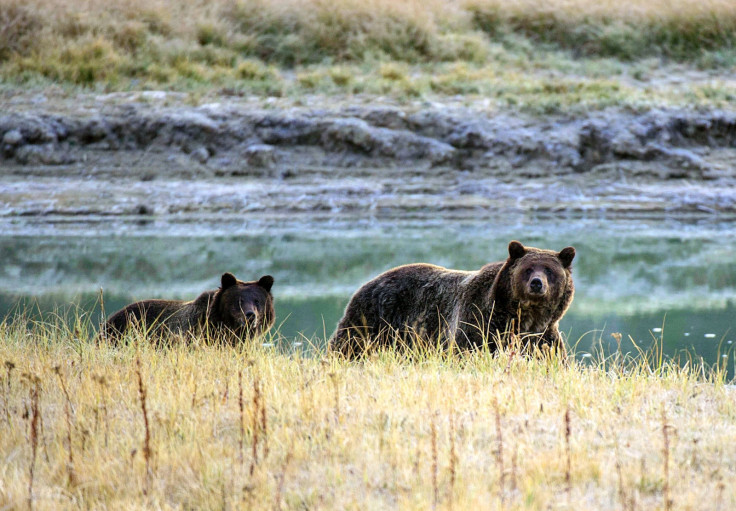Wyoming: Mother grizzly 399 mourns death of bear cub Snowy after suspected hit-and-run in park
The cub, potentially 399's last ever offspring, was struck and killed by a car on Sunday night (19 June).

A well-known bear cub named Snowy has been killed in a suspected hit-and-run in Grand Teton National Park in Wyoming, prompting an outpouring of emotion from wildlife campaigners.
Snowy, named after the light-coloured fur around its face, was believed to be this year's lone cub of a popular 20-year-old grizzly bear named 399.
The cub, potentially 399's last ever offspring, was struck and killed by a car on Sunday night (19 June), a short distance from the Pilgrim Creek drainage. Park officials said its mother was seen frantically attending to her cub, eventually removing it from the road.
One witness of the aftermath, wildlife photographer Deby Dixon, claimed 399 refused to leave her cub's side. She was later reportedly seen moving "erratically" through the Pilgrim Creek drainage.
Dixon said: "[Snowy] was just beautiful and had this snowy white face. Everybody is just in tears, all day long. It's a deep loss." She added: "[399] was very agitated and appeared distraught. Truly heartbreaking to watch this mama look for her son and mourn his loss."
Grizzly 399 rose to fame in 2006 when she would be regularly spotted by park visitors with her three cubs. She has since become a favourite of wildlife photographers.
A Facebook post by Wyoming Wildlife Advocates said: "The death of this cub is especially tragic since Grizzly 399 is nearing the end of her reproductive life, and sadly she has only replaced herself in the population with one adult female, Grizzly 610.
"399's cub, known as Snowy or Spirit by the bear watchers of Grand Teton, was adored for its antics and notably white face and will be sorely missed."
"The family portrait" - 399 and cub 'Snowy' in Grand Teton National Park, Wyoming.(840mm, 1/400, f/5.6, ISO 100, - 2/3 EV)
Posted by Natural Photography on Saturday, June 11, 2016
Andrew White, spokesman for Grand Teton national park, said the days following her cub's death will likely leave 399's behaviour "fairly unpredictable", but added: "After a day or two, she'll become accustomed to not having a cub."
In a separate incident just hours earlier, an adult female bear aged between 15 and 20-years-old was also struck by a vehicle in the same park. Again, the vehicle did not stop or report the accident.
So far this year, 37 large animals are known to have been struck by vehicles on the park's roadways. This includes one grizzly bear cub, two black bears, nine deer, two bison, nine elk, two coyotes, and one red fox. Over 100 large wildlife are known to be hit on park roadways annually, with 118 in 2015 and 115 in 2014.
"These unfortunate incidents are an important reminder for all of us to slow down and be vigilant when we travel through the park," said the park's superintendent, David Vela. "Especially with the traffic levels that we are seeing during this busy season, it's important to obey posted speed limits, maintain a safe following distance behind other vehicles, and be especially watchful around dawn and dusk when wildlife are more active."
In 1975, grizzly bears in the 22.5-million acre Greater Yellowstone Ecosystem area, which includes Grand Teton, became protected after being designated as a species threatened with extinction.
The National Park Service (NPS) says the growth and expansion of the grizzly bear population has since been "a remarkable conservation success story", rising from 136 in 1975 to about 700 today.
There are currently proposals to remove the animals from protection, however, which would open the door to bear hunting permits being granted outside the national park.
Dixon said: "One positive is that Snowy's death will result in more people fighting against the delisting of the bears. They are just too important to our hearts and the eco-system."
Grizzly 399, who gave birth to Snowy in May, had survived being killed by park rangers in 2007 after she defensively mauled a hiker in Grand Teton who stumbled across an elk carcass she and her cubs had just killed. The hiker pleaded for rangers to spare the bear, saying it was only trying to protect her cubs.
© Copyright IBTimes 2025. All rights reserved.






















